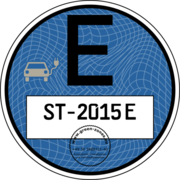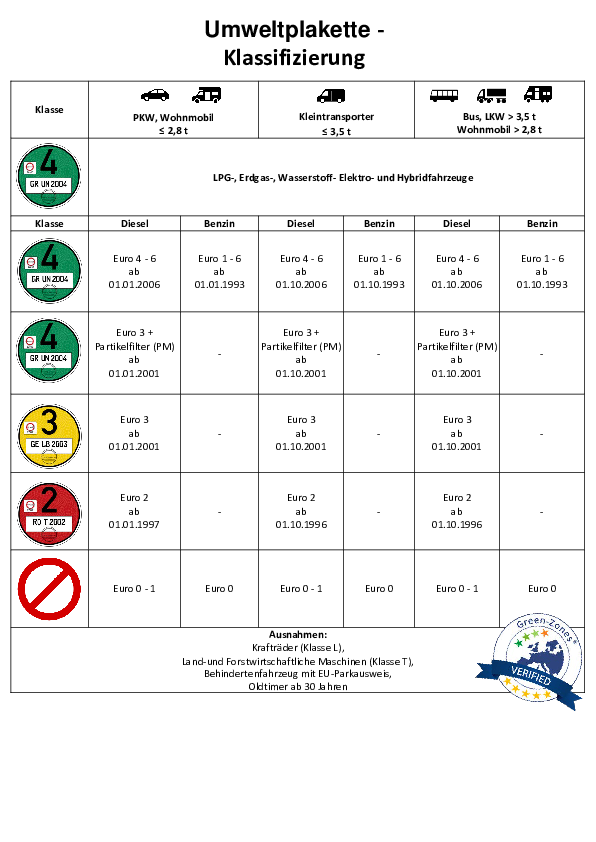The German fine dust emission sticker is compulsory when entering green environmental zones.
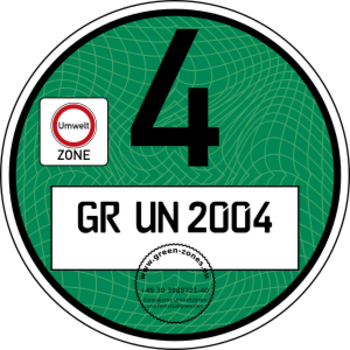
The environmental sticker was introduced on 01.03.2007 and has been compulsory for all cars, lorries and buses in German environmental zones since 01.01.2008. The fine dust sticker was divided into 3 different colours, red, yellow and green, depending on the EURO class. The rules for the now more than 80 zones have been gradually tightened, so that in almost all German cities only the green environmental sticker is allowed to enter. If a sticker is missing, a fine of €100 is levied. Since 2018, additional diesel driving ban zones have been added, which exclude older diesels from certain routes and areas. Here, the green environmental sticker is no longer sufficient.
Information about the environmental badge for Germany
Which sticker do I get?
Which vehicles are affected?
The following vehicles are affected by the German environmental zones and require a green environmental badge upon entry:
Car, motorhome (M1), minibus (M2), coach (M3), van (N1), lorry (N2), heavy lorry (N3).
This does not apply to motorbikes or agricultural and forestry machinery.
What does the environmental badge look like?
There are three environmental badges with three different colours: red, yellow and green. The environmental badges have a diameter of 80 millimetres with a black border 1.5 millimetres thick. The numbers of the stickers (2,3, and 4) each have a height of 35 millimetres and are in the colour black RAL 9005. The lettering field for the number plate measures 60 x 20 millimetres and is in the colour pure white RAL 9010.
The official colour of the red plate is traffic red RAL 3020.
Traffic yellow RAL 1023 is the official colour of the yellow badge.
The green sticker has the official colour traffic green RAL 6024.
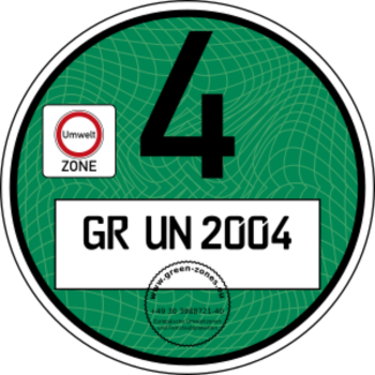
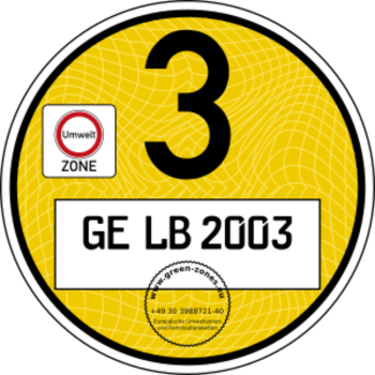
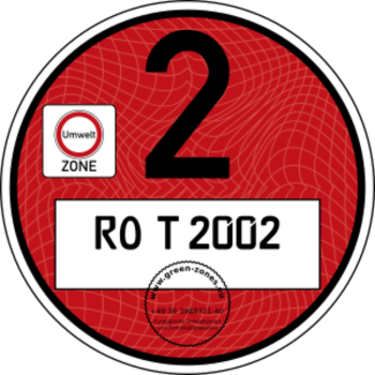
What fines can I get?
With the amendment of the German catalogue of fines as of 09.11.2021, it was determined that a fine of 100 euros will be levied for driving in an environmental zone without a valid environmental badge or for stopping or parking in an environmental zone without a valid environmental badge.
Under the offence number 141621, it is regulated there that despite a traffic ban for the reduction of harmful air pollution, participation in traffic with a motor vehicle took place. In addition to the fine of 100 euros, there is a final processing fee of approximately 25 euros.
Important to know for foreigners:
According to EU Directive 2011/82 of 25.10.2011 "on facilitating the cross-border exchange of information on road safety related traffic offences", non-payment of a fine of 70 euros or more will result in enforcement proceedings in the home country, up to and including imprisonment.
Are there exceptions?
The general exemptions from the obligation to display a sticker in German environmental zones are regulated in the 35th BlmSchV. According to this, the following motor vehicles are exempt from the sticker requirement:
1) mobile machinery and equipment
2) working machines
3) Agricultural and forestry tractors
4) Two- and three-wheeled motor vehicles*.
5) Ambulances, doctor's cars with the appropriate marking "doctor emergency".
6) Motor vehicles driven or driven by persons who are exceptionally handicapped, helpless or blind and who prove this by means of the signs "aG", "H" or "BI" entered on the severely handicapped person's identity card in accordance with § 3 par. 1 nos. 1 to 3 of the Severely Handicapped Persons' Identity Card Ordinance.
7) Vehicles for which special rights may be claimed in accordance with § 35 of the Road Traffic Regulations.
8) Vehicles of non-German troops of States not party to the North Atlantic Treaty who are in Germany within the framework of military cooperation, insofar as they are used for journeys for urgent military reasons.
9) Civilian motor vehicles used on behalf of the Federal Armed Forces, insofar as they are used for journeys that cannot be postponed for the fulfilment of sovereign tasks of the Federal Armed Forces.
10) Vintage cars (as defined in section 2 no. 22 of the Vehicle Registration Ordinance) bearing a registration plate in accordance with section 9(1) or section 17 of the Vehicle Registration Ordinance or vehicles registered in another Member State of the European Union, another Contracting Party to the Agreement on the European Economic Area or Turkey, if they meet equivalent requirements.
*Quads are assigned to vehicle class L and therefore do not require an environmental sticker.
Are there other low emission zones and stickers in Europe?
Certificat qualité de l'Air France
On 01.07.2016, an environmental sticker called Certificat qualité de l'Air was introduced in France. Since July 2017, all vehicles, including foreign vehicles, entering French environmental zones must have a valid French vignette, which is mandatory for each vehicle category. The vignette can be divided into 6 categories and colours, depending on the year of registration, the energy efficiency and the emission of the vehicle. The Certificat qualité de l'Air is valid in all fixed, permanently valid environmental zones (ZFE/ZCR) and weather-related, temporary zones (ZPA/ZPAd). Fines of €68 - €375 apply for a missing vignette.

Environmental Picker Label Austria
In Austria, the environmental sticker has been compulsory for all trucks in classes N1-N3 since 01.01.2015. The environmental sticker is available in 6 different colours that represent the respective EURO class. The colours available from EURO 1 to 6 are black, red, yellow, green, blue and violet. The last 6 digits of the chassis number are written on the sticker, the vehicle class and fuel type are stamped and a control number is also embossed. The sticker is currently valid in the six environmental zones introduced in Vienna, Upper Austria, Lower Austria, Styria, Tyrol and Burgenland. Violation of the environmental sticker obligation can be punished with high fines of up to 2,180 euros.
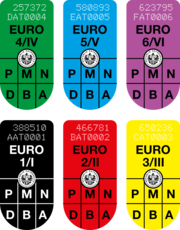
Registration Belgium
Registration Brussels:
As of 01.01.2018, a Low Emission Zone (LEZ) applies in Brussels for all 19 municipalities of the region, which requires timely prior registration for entry. The Brussels LEZ is permanently valid, i.e. 24 hours and 7 days a week, including Sundays and public holidays. The LEZ regulates access for the vehicle categories trucks of class N1, buses of class M2, M3 and cars of class M1. In 2022 and 2025, access permits for entering the LEZ will be further tightened. A control of compliance with the prescribed rules will be carried out with the help of ANPR cameras. A fine of €150 - €350 will be levied for each unregistered vehicle registered outside the Netherlands and Belgium.
Registration Antwerp & Ghent:
The Flemish Region has introduced two Low Emission Zones (LEZ) that require registration for each vehicle type before entry. The city of Antwerp designated the entire city centre and part of the Linkeroever district as LEZs on 01.02.2017. Since 01.01.2020, the entire city centre of Ghent became an LEZ and a general speed limit of 30 km/h was set at the same time. A control of the compliance with the prescribed rules, which are valid 24h a day and 7 days a week, is carried out with the help of ANPR cameras. An unregistered vehicle is punished with a fine of 150 - 350 €.
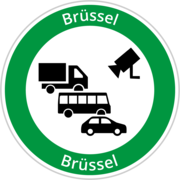
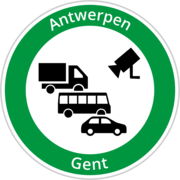
Stick'Air Vignette Switzerland
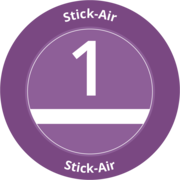
Registration Barcelona
Barcelona is the only Spanish city so far to have introduced registration with camera surveillance, which has been mandatory for foreigners since 2020. The nationally valid Distintivo Ambiental sticker only applies here to vehicles registered in Spain. Registration must be carried out for all vehicle categories. Cameras are positioned at numerous points in the environmental zones and scan every vehicle completely automatically. The registration number is recorded and compared with a database. If the comparison reveals that you should not have been driving, you have to pay a fine of 200 - 1800 €.

E-Plate Germany
On 25.09.2015, the German Electric Mobility Promotion Act was passed to provide electric and hybrid vehicles with additional benefits. This allows domestic e-vehicles (cars registered in Germany) to receive their own special e-licence plate. Foreign vehicles (all cars not registered in Germany) can obtain an E-plate so that they too can enjoy the benefits and privileges, such as access to environmental and bus lanes and free parking, in Germany.
